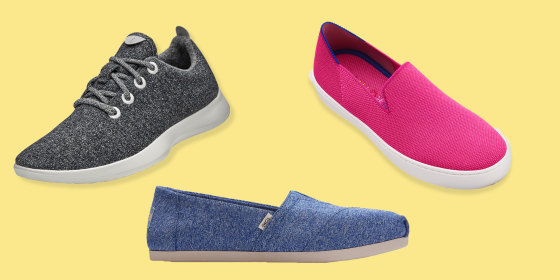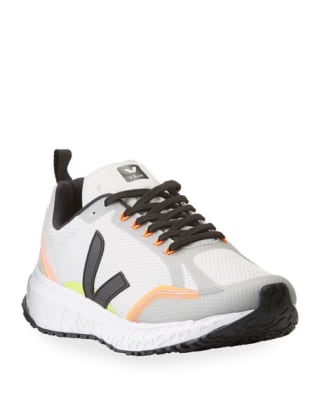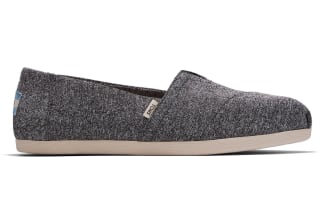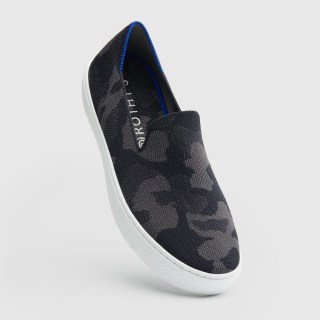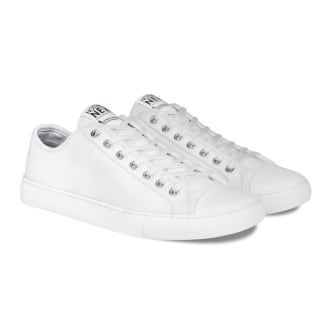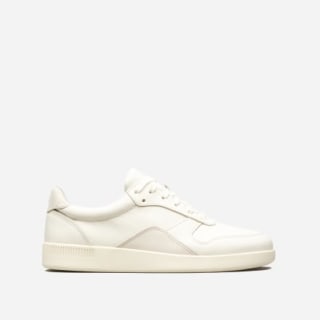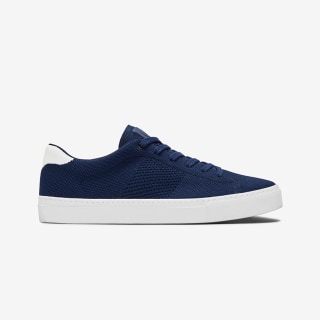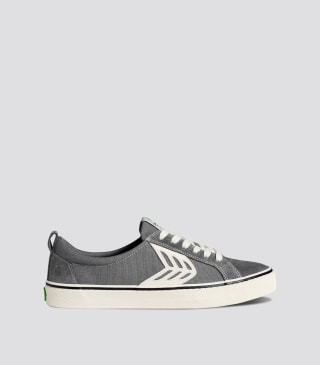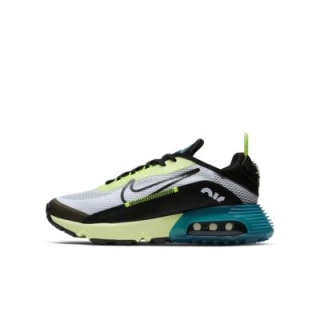While the coronavirus pandemic has some covering their sneakers while they’re out or keeping them out once they get inside, many of us can claim one pair of sneakers or another among our belongings. Sneakers have been growing increasingly popular in recent years thanks to style trends and a changing workforce attire that might allow them when once it didn’t, says Daniel McLoughlin, a sneaker expert at shoe reviewing site RunRepeat. For example, some researchers predict the sneaker market will hit $95 billion by 2025.
While that might be a plus for some, the sneaker market carries a significant negative, as well: Sneakers carry a large environmental footprint. The average sneaker contains many parts and is difficult to make — and most sneakers contain plastics that are not biodegradable. On top of that, one study found that making a pair of running shoes generates an average of 30 pounds of carbon dioxide. This is all compounded by the fact that many sneakers are trend-driven, meaning they are often purchased and then discarded relatively quickly.
Full coverage of the coronavirus outbreak
In this article:
- What are eco-friendly sneakers
- Why shop for eco-friendly sneakers
- How to shop for sneakers
- The best eco-friendly sneakers
What are eco-friendly sneakers?
Conventional sneakers are generally made from leather, plastic or rubber, said McLoughlin. The sneaker manufacturing practice is extremely energy-intensive, producing a large amount of greenhouse gasses. Additionally, an estimated 80 percent of sneakers go to landfills, he said.
“The fact that shoes are made of so many different materials is what makes them so hard to recycle,” McLoughlin told NBC News. “They break down very slowly, and when they do, they release toxins, chemicals and fossil fuels into the surrounding environment.”
If you bought a pair of shoes made out of recycled soda bottles that falls apart in a couple months, that’s probably less eco-friendly than just buying a pair of standard sneakers and wearing them for years.
Pete Lankford, footwear industry consultant
There’s no concrete definition on what makes a sneaker eco-friendly or sustainable, but most of the leading models boast a build using recycled materials, like plastic and rubber, or renewable materials, like cotton or cork. While it’s nearly impossible to create a completely recycled shoe, due to the sheer amount of materials used, most eco-friendly models are a step in the right direction, said McLoughlin.
There’s also typically no difference in performance between sustainable and standard sneakers, said McLoughlin. “Having said that, there is a calculation to be made when buying sneakers. For example, a pair of sustainable Allbirds sneakers are not as strong as a pair of Air Jordans,” he said.
Why shop for eco-friendly sneakers?
Shoppers (like you) might be paying more attention to where their purchases come from and the resulting environmental impact these days, says Pete Lankford, a footwear industry consultant and former design director for Timberland. Shoe companies are therefore more incentivised to offer sustainable options. “The expectation is that these companies are going to be transparent,” Lankford said. “That they have standards in how they make the shoes, what materials are used and the environmental impact.”
One example is TOMS, a shoewear company best known for their slip-on canvas shoe and charity work. The company recently launched its Earthwise collection, knit sneakers with linings made from recycled plastic water bottles and dyed using all-natural plant dye, according to the brand. Smaller start-ups like Allbirds and Veja have wholly dedicated themselves to producing sustainable shoes. Meanwhile, shoe-wear giants like Adidas and Nike say they’re working to make their production more environmentally friendly, said McLoughlin.
If you’re in the market for a new pair of sneakers and want to limit your environmental impact, purchasing eco-friendly sneakers is a good solution. But what does “eco-friendly” or “sustainable” even mean when it comes to sneakers? Here’s what to know about eco-friendly sneakers — and just how good for the environment they might be.
How to shop for eco-friendly sneakers
Watch out for greenwashing, or “the practice of marketing products as environmentally friendly, regardless of their actual impact,” said Brett Chamberlin, director of community engagement at the Story of Stuff Project, an environmental nonprofit. It’s essential to look past the marketing language and at the ingredients in the shoe. “Seeing words like 'sustainable' or 'eco-friendly' on a product label doesn't actually tell you anything meaningful,” he said.
“If you bought a pair of shoes made out of recycled soda bottles that falls apart in a couple months, that’s probably less eco-friendly than just buying a pair of standard sneakers and wearing them for years,” says Lankford, who says there are three major factors you should consider while shopping for eco-friendly sneakers:
- That the shoes are actually durable and last a long time
- That the materials themselves have been recycled
- Or that the materials are renewable, meaning it’s more environmentally-friendly to produce than a conventional material
Of course, it’s also important to consider the potential performance of the shoe. While there may be some trade-offs, “There doesn't have to be a reduction in performance for a more sustainable shoe,” said McLoughlin. “For example, the Adidas Parley sneakers are just as durable as the conventional equivalent of those sneakers.”
The best eco-friendly sneakers
If you’re shopping for a new pair of sneakers and want to go eco-friendly, here are some of the best options around.
1. Veja's The Condor
This shoewear startup is dedicated to ethical shoe-making. Their running shoe, the Condor, sports colorful designs, and is made with 53 percent recycled plastic and natural materials like rubber, organic cotton and rice waste. According to their website, Veja’s rubber soles are made from responsibly-run forests in Brazil. The company also says it supports competitive wages and social protection for their workers.
2. TOMS Earthwise
TOMS is best known for its one-for-one charitable business model, partnering with nonprofits to give children in need new shoes. Their new collection, Earthwise, is made from vegan and environmentally-friendly materials, including hemp, cotton and recycled polyester. The shoes are also dyed using all-natural plant dye.
3. Rothy’s The Sneaker
The womenswear brand, best known for its ballet flats, now has a slide-on sneaker made from fibers derived from recycled water bottles. The sneaker comes in 10 different colors and patterns, and is highly rated. Since the company launched, Rothy’s says it has has recycled more than 50 million plastic water bottles. Another perk: The sneakers are machine washable.
4. Allbirds Wool Runners
This popular shoe is made with wool from merino sheep, as well as other materials like recycled bottles, castor bean oil and recycled cardboard. According to its website, Allbirds production uses 60 percent less energy than synthetic shoes. They are certified by the Forest Stewardship Council, an independent nonprofit that rates products for sustainability. Allbirds has also committed to becoming carbon-neutral, meaning that for every ton of carbon the company emits, they will pay to “take” a ton of carbon out of the atmosphere by purchasing credits from third-party emission reduction products, known as “carbon offsets."
5. Nothing New Low Top
The environmental shoewear brand was founded just last year, dedicated to making stylish, sustainable sneakers. As the name suggests, Nothing New shoes are only created with recycled materials, including recycled plastic, cotton, fishing nets, rubber and cork. The company also offers customers who send back their used sneakers a $20 discount on a new pair.
6. Tread by Everlane
This company is best known for its simple, minimalistic look, and its sneakers are no exception. Unlike Allbirds, Tread Trainers are created using conventional sneaker materials that are either recycled or comes from a sustainable source. The Tread’s sole is almost entirely free of plastic (using recycled rubber instead) and the laces and linings are made of recycled plastic bottles. The shoe’s leather is sourced from a tannery that’s certified gold by the Leather Working Group, which maintains environmental protocols for leather.
7. Adidas X Parley
The sportswear giant partnered with environmental organization Parley for the Oceans in 2015, and has committed to transition fully to recycled plastic by 2024. According to Adidas’ website, the company has produced 11 million pairs of shoes using upcycled plastic waste, keeping 2810 tons of plastic out of the ocean. This model is knit with rubber soles and is designed for long-distance trail running.
8. Greats Royale Knit
The Royale Knit sneaker is made with yarn from recycled single-use ocean plastics. Each pair's production is the equivalent of recycling seven plastic bottles. This style is a bestseller on the site and comes in multiple colors including white, gray, blush and more.
9. Cariuma Catiba Low
This classic-looking sneaker is made with premium materials, including a suede and cotton canvas, as well as vegetable-dyed leather. The insole features a memory foam bottom and its packaging uses recycled and recyclable materials.
10. Nike Air Max 2090
Featuring lightweight and breathable mesh, this shoe celebrates the 30th anniversary of the classic Air Max 90. The sole is cushioned for added comfort and the open-hole tongue and heel tab combine so you can easily pull on and take off the shoe. Currently, the Air line is composed of at least 50 percent recycled manufacturing waste — and Nike Air manufacturing facilities divert more than 95 percent of waste from landfills.
Catch up on Select's in-depth coverage of personal finance, tech and tools, wellness and more, and follow us on Facebook, Instagram and Twitter to stay up to date.
